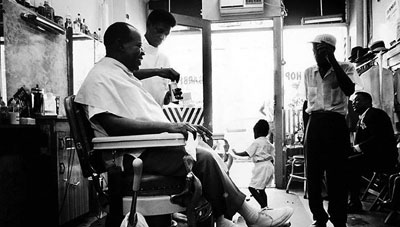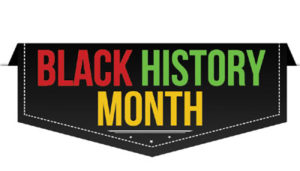Submitted by HistoryMakers.
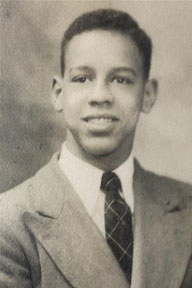
Black barbers and barbershops have a long and unique history in the U.S., with roots in the era of slavery, where owners leased out enslaved men to cut the hair of local prominent white men. Over time, barbershops grew to become “safe” cultural and social hubs for Black men while providing services to the community and financial independence for the owner. As Bishop T.D. Jakes put it, “the barbershop was really (laughter) the place where Black men got together… where everybody talked about everything, politics and life and talked about everybody (laughter).”[1]
In the early days, being a barber was a noble profession. The great-great-grandfather of corporate executive George Levi Knox, III, is an example of this: “The story is that he [Charles Knox] followed an Indiana regiment out of Tennessee as it made its way home after the Civil War and wound up [in Greenfield, Indiana]… He had been a slave… and… he opened a barbershop… all the barbers were Black essentially, and that’s what free Blacks… [were] allowed to do.”[2] There was also typically plenty of work, as white men were accustomed to having their hair cut by African Americans. Civil rights
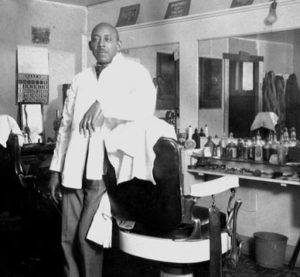
activist and English professor Gloria Rackley Blackwell (1927 – 2010) further explained: “Daddy [Harrison Blackwell, Sr.]… had his own barbershop [in Little Rock, South Carolina]… but it was for whites only since it was segregated… Now the barber could make up his mind, he could decide that he’s going to have a Black barbershop. He would also probably be deciding… how he wants to live,”[3] referencing that “this was due to economic reasons, mainly being that barber’s financial stability.”[4] This is how one of the first African American millionaires, Alonzo Herndon, began his empire in the 1870s, as archivist Herman “Skip” Mason told: “Herndon… was this former slave, born in Social Circle, Georgia… walked to Atlanta on foot… started this barber shop, saved his money, invested in real estate, became very wealthy… created Atlanta Life, and became one of Atlanta’s first Black millionaires.”[5]
Painter and barber James Guilford (1911 – 2015), who owned Jimmy Guilford’s Hairstyling Salon, which catered to Boston’s Black elite, got his start during segregation as well: “During the Depression, the ‘20s [1920s] and ‘30s [1930s]… I sold newspapers, and I started barbering at the age of twelve to help out… I was cutting hair at the time for thirty-five cents a haircut and fifteen cents for a shave… I was in high school when I was taught how to become a barber… I went to Mr. Gordon [ph.] who had a barbershop [in Boston]… as Black barbers, at that time… [who] came out of the South… serviced… all the prominent white people… and they were very disciplined about their business.”[6]
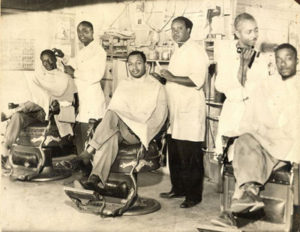
Business, civic leader and supporter of the 1968 Memphis sanitation workers’ strike, Fred Davis (1934 – 2020), pointed to the flexibility the barber profession allowed his father as a business owner: “He worked in two places, primarily he worked in barbershops that other people owned and then twice… he turned the living room of his house into a barbershop… the barbershop was in front and we lived in the back and… He worked in plants… ten months or a year and then he’d quit, came back to that [barbering] because… he was used to being his own boss and doing it like he wanted to do it.”[7] Lead vocalist of the well-known group The Platters, Sonny Turner, remembered the opportunities it gave young people as well: “During elementary school… we were all about trying to be entrepreneurs and trying to learn to make money… I started in the barbershop sweeping up… those guys were like mentors… They would mentor you… about growing up and what a man is… get a job. Go to school, learn something. Become somebody… have self-respect. They were all about that.”[8]
Barbers are where many were mentored, scolded, educated and advised, as portrayed in director Charles Randolph-Wright’s “play… ‘Cuttin’ Up’… based on a book [‘Cuttin’ Up: Wit and Wisdom from Black Barber Shops’], Craig Marberry, where he went around and interviewed these barbers… one story just so affected me which happened in Atlanta… And this young woman goes into this barbershop, and she says… ‘Excuse me. I don’t mean to interrupt you, but I watch you… and I see how you always wearing a tie and how you how you treat people in your business… I have three sons, and I wondered if I can bring them by and watch you.’ He said, ‘Watch me? Why?’ She says, ‘I want to expose my sons to a Black man doing something positive.’”[9] Roger Gore, co-founder of The Hair Gangsters, a group of stylists who traveled around the country teaching hair styling classes, explained the draw barbers have: “I just admired the way… the community loved the barbers… they always had money seemed like… had a nice car, Cadillacs… and everybody came there in the neighborhood.”[10]
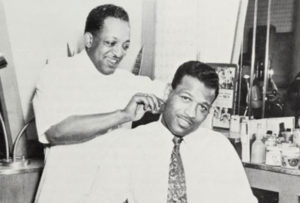
Barbershops were also the communication center, the local watering hole, the place you learned what was really happening in a community as noted by historian Thomas C. Holt, whose father was a barber: “I learned more about… history, human relations, and current events in the barbershop than… anywhere else… incredible debates about one thing or another, sometimes frivolous, sometimes very important stuff, a place where all kinds of characters pass through from the… stuck up… high school principal or doctor to… the character on the street… talking a mile a minute and my father out talking everybody… and I suspect I learned a lot.”[11] High school principal Malcolm Hemphill, Jr. had a similar experience: “My grandfather, was a barber, Steve Dickey… always worked in a shirt and tie… He had a barbershop [in Chicago, Illinois]… and I learned so much from him as a kid… when I worked in the barbershop shining shoes… historically, they gave me such a perspective of life in the Black community, the kinds of things that they were doing, the kinds of things that they experienced… it was a learning experience for us. It was just phenomenal.”[12]
For former Virginia Governor L. Douglas Wilder, it is where he developed his speaking skills: “The barbershop was a place that was my forum. And the older men would listen to me because they said the kid might know what he’s talking about because I would come and argue with them, fuss with them about what I knew and what the encyclopedia said… I’d run home and bring the encyclopedia back, said this is it. So, the men started betting on me in terms of the kid knows what he’s saying. And it was I guess the first opportunity I had to engage in public speaking.”[13] Judge James R. Spencer, on the other hand, who grew up in Florence, South Carolina, looked forward to going so he could enjoy Jet magazine: “I’ve got a huge Jet magazine collection (laughter)… I just saved them over the years… they used to have it at the barber shop… and I worked a deal with a barber. I was like, ‘Okay… when this stuff gets… too old… you don’t want to put it out here, can I take a couple?’ He said, ‘Sure, sure.’ So… I was always reading Jet magazine… It was important to me to be able to see somebody who looked like me doing great things. And I didn’t get that from any other place.”[14]
Over the course of about 150 years, “throughout war and times of economic drought, barbershops acted a safe haven. Discussions of social and societal reform took place there… individuals found not only confidence in themselves, but in their communities, and more largely their country. Today, barbers and barbershops continue to thrive and exude confidence on communities.”[15] Actor and comedian Cedric The Entertainer, who starred in the ‘Barbershop’ film franchise, concluded: “That’s the place where you… hear the language, you hear the stories… and what’s going on… the barbershop has always been… in our culture.”[16]

